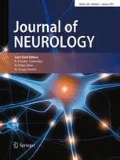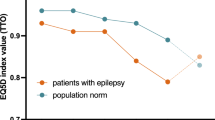Abstract
Background
Epilepsy in children negatively impacts on caregiver quality of life (QOL). The study aimed to evaluate the relationships between patient factors [demographics, clinical factors, health-related quality of life (HRQL)], contextual factors (socio-economic factors), caregiver mood, and caregiver QOL, and whether family factors mediate the relationship between patient HRQL and caregiver QOL.
Methods
Children aged 4–18 years with medically intractable epilepsy were enrolled. Patient demographics, clinical data, patient HRQL [measured using Quality of Life in Childhood Epilepsy Questionnaire (QOLCE)], socio-economic factors, caregiver anxiety and depression, and family factors (adaptation, resources and demands) were assessed. Caregiver QOL was measured using CarerQol, which evaluates care-related QOL, incorporating the negative and positive effects of caregiving.
Results
One hundred and eighty-one children were studied. In bivariable regression analysis, higher patient HRQL (QOLCE) (β = 0.54, p < 0.001) and household income (β = 10.49, p = 0.019) were associated with higher caregiver QOL. Higher depression (β = − 2.48, p < 0.001) and anxiety (β = − 2.04, p < 0.001) were associated with lower caregiver QOL. Seizure severity and other socio-economic factors did not influence caregiver QOL (all p > 0.05). In multivariable regression analysis, higher QOLCE (β = 0.21, p = 0.001), lower depression (β = − 1.07, p < 0.001) and lower anxiety (β = − 1.19, p < 0.001) were associated with higher caregiver QOL. Family demands and resources moderated the relationship between patient HRQL and caregiver QOL.
Conclusions
Patient HRQL and caregiver mood were more important correlates of caregiver QOL than seizure severity in medically intractable epilepsy. The findings are significant in delineating variables (caregiver mood and family factors) that are potentially modifiable, and show promise for improving caregiver QOL.


Similar content being viewed by others
References
Jensen MP, Liljenquist KS, Bocell F et al (2017) Life impact of caregiving for severe childhood epilepsy: results of expert panels and caregiver focus groups. Epilepsy Behav 74:135–143
Rodenburg R, Meijer AM, Deković M et al (2005) Family factors and psychopathology in children with epilepsy: a literature review. Epilepsy Behav 6:488–503
Reilly C, Taft C, Edelvik A et al (2017) Health-related quality of life and emotional wellbeing improve in parents after their children have undergone epilepsy surgery—a prospective population-based study. Epilepsy Behav 75:196–202
Reilly C, Taft C, Nelander M et al (2015) Health-related quality of life and emotional well-being in parents of children with epilepsy referred for presurgical evaluation in Sweden. Epilepsy Behav 53:10–14
Lv R, Wu L, Jin L et al (2009) Depression, anxiety and quality of life in parents of children with epilepsy. Acta Neurol Scand 120:335–341
Bompori E, Niakas D, Nakou I et al (2014) Comparative study of the health-related quality of life of children with epilepsy and their parents. Epilepsy Behav 41:11–17
Mori Y, Downs J, Wong K et al (2017) Impacts of caring for a child with the CDKL5 disorder on parental wellbeing and family quality of life. Orphanet J Rare Dis 19:12:16
Gallop K, Wild D, Verdian L et al (2010) Lennox–Gastaut syndrome (LGS): development of conceptual models of health-related quality of life (HRQL) for caregivers and children. Seizure 19:23–30
Borusiak P, Bast T, Kluger G et al (2016) A longitudinal, randomized, and prospective study of nocturnal monitoring in children and adolescents with epilepsy: effects on quality of life and sleep. Epilepsy Behav 61:192–198
Raina P, O’Donnell M, Schwellnus H et al (2004) Caregiving process and caregiver burden: conceptual models to guide research and practice. BMC Pediatr 4:1
Puka K, Tavares TP, Anderson KK et al (2018) A systematic review of quality of life in parents of children with epilepsy. Epilepsy Behav EB 82:38–45
Mendes TP, Crespo CA, Austin JK (2017) Family cohesion, stigma, and quality of life in dyads of children with epilepsy and their parents. J Pediatr Psychol 42:689–699
Puka K, Ferro MA, Anderson KK et al (2018) Health-related quality of life in mothers of children with epilepsy: 10 years after diagnosis. Qual Life Res 27:969–977
Conway L, Smith ML, Ferro MA et al (2016) Correlates of health-related quality of life in children with drug resistant epilepsy. Epilepsia 57:1256–1264
Harris PA, Taylor R, Thielke R et al (2009) Research electronic data capture (REDCap)—a metadata-driven methodology and workflow process for providing translational research informatics support. J Biomed Inform 42:377–381
Wechsler D (2011) Wechsler Abbreviated Scale of Intelligence (WASI) manual. The Psychological Corporation, San Antonio
Wechsler D (2012) Technical and interpretive manual for the wechsler preschool and primary scale of intelligence. The Psychological Corporation, San Antonio
Sabaz M, Cairns DR, Lawson JA et al (2000) Validation of a new quality of life measure for children with epilepsy. Epilepsia 41:765–774
Sabaz M, Lawson JA, Cairns DR et al (2003) Validation of the quality of life in childhood epilepsy questionnaire in American epilepsy patients. Epilepsy Behav 4:680–691
Bernstein IH, Rush AJ, Trivedi MH et al (2010) Psychometric properties of the Quick Inventory of Depressive Symptomatology in adolescents. Int J Methods Psychiatr Res 19:185–194
Spitzer RL, Kroenke K, Williams JBW et al (2006) A brief measure for assessing generalized anxiety disorder: the GAD-7. Arch Intern Med 166:1092–1097
Löwe B, Decker O, Müller S et al (2008) Validation and standardization of the Generalized Anxiety Disorder Screener (GAD-7) in the general population. Med Care 46:266–274
Smilkstein G, Ashworth C, Montano D (1982) Validity and reliability of the family APGAR as a test of family function. J Fam Pract 15:303–311
Smilkstein G (1978) The family APGAR: a proposal for a family function test and its use by physicians. J Fam Pract 6:1231–1239
FILE (1996) Family inventory of life events and changes. Family assessment: resiliency, coping and adaptation. Inventories for research and practice. University of Wisconsin Publishers, Madison
McCubbin H, Thompson A, McCubbin MFIRM (1996) Family inventory of resources for management. Family assessment: resiliency, coping and adaptation. Inventories for research and practice. University of Wisconsin Publishers, Madison
Brouwer WBF, van Exel NJA, van Gorp B et al (2006) The CarerQol instrument: a new instrument to measure care-related quality of life of informal caregivers for use in economic evaluations. Qual Life Res 15:1005–1021
Hoefman RJ, van Exel J, Brouwer WBF (2017) Measuring care-related quality of life of caregivers for use in economic evaluations: CarerQol tariffs for Australia, Germany, Sweden, UK, and US. PharmacoEconomics 35:469–478
Hoefman RJ, van Exel J, Rose JM et al (2014) A discrete choice experiment to obtain a tariff for valuing informal care situations measured with the CarerQol instrument. Med Decis Mak 34:84–96
Hoefman R, Payakachat N, van Exel J et al (2014) Caring for a child with autism spectrum disorder and parents’ quality of life: application of the CarerQol. J Autism Dev Disord 44:1933–1945
Bobinac A, van Exel NJA, Rutten FFH et al (2010) Caring for and caring about: disentangling the caregiver effect and the family effect. J Health Econ 29:549–556
Fitzgerald C, George S, Somerville R et al (2018) Caregiver burden of parents of young children with cystic fibrosis. J Cyst Fibros 17:125–131
Westphal-Guitti AC, Alonso NB, Migliorini RCVP et al (2007) Quality of life and burden in caregivers of patients with epilepsy. J Neurosci Nurs 39:354–360
van Andel J, Zijlmans M, Fischer K et al (2009) Quality of life of caregivers of patients with intractable epilepsy. Epilepsia 50:1294–1296
Camfield C, Breau L, Camfield P (2001) Impact of pediatric epilepsy on the family: a new scale for clinical and research use. Epilepsia 42:104–112
Thompson PJ, Upton D (1992) The impact of chronic epilepsy on the family. Seizure 1:43–48
Datta SS, Premkumar TS, Fielding S et al (2006) Impact of pediatric epilepsy on Indian families: influence of psychopathology and seizure related variables. Epilepsy Behav 9:145–151
Smith G, Wagner J, Andrews J et al (2014) Caregiving in pediatric epilepsy: results of focus groups and implications for research and practice. Epilepsy Behav 34:34–41
Soria C, Callu D, Viguier D et al (2008) Parental report of cognitive difficulties, quality of life and rehabilitation in children with epilepsy or treated for brain tumour. Dev Neurorehabilitation 11:268–275
Jones C, Reilly C (2016) Parental anxiety in childhood epilepsy: a systematic review. Epilepsia 57:529–537
Ferro MA, Speechley KN (2009) Depressive symptoms among mothers of children with epilepsy: a review of prevalence, associated factors, and impact on children. Epilepsia 50:2344–2354
Ferro MA, Speechley KN (2012) What about dads? An exploratory analysis of depressive symptoms in paternal primary caregivers of children with epilepsy. Epilepsy Behav 23:90–91
Moreira H, Carona C, Silva N et al (2013) Psychological and quality of life outcomes in pediatric populations: a parent-child perspective. J Pediatr 163:1471–1478
Speechley KN, Ferro MA, Camfield CS et al (2012) Quality of life in children with new-onset epilepsy: a 2-year prospective cohort study. Neurology 79:1548–1555
Acknowledgements
PEPSQOL Study Team: O. Carter Snead and Cristina Go (Hospital for Sick Children, Toronto), Mary Connolly (BC Children’s Hospital, Vancouver), Rajesh Ramachandrannair (McMaster Children’s Hospital, Hamilton), Lionel Carmant (Ste. Justine Children’s Hospital, Montreal), Kathy Speechley (Western University, London), Andrea Andrade (Children’s Hospital at London Health Sciences Centre, London), Mark Ferro (University of Waterloo, Waterloo), Luis Bello-Espinosa (Alberta Children’s Hospital, Calgary), Qi Xu and Edward Leung (The Children’s Hospital, Winnipeg), Salah Almubarak (Royal University Hospital, Saskatoon), and Paula Brna (IWK Health Center, Halifax).
Funding
PEPSQOL (Impact of Pediatric Epilepsy Surgery on Health-Related Quality of Life) was funded by a Grant from the Canadian Institutes for Health Research (MOP-133708) to Dr. E Widjaja and Dr. ML Smith.
Author information
Authors and Affiliations
Consortia
Corresponding author
Ethics declarations
Conflicts of interest
The authors declare no competing financial interest.
Ethics
We confirm that we have read the Journal’s position on issues involved in ethical publication and affirm that this report is consistent with those guidelines.
Additional information
The members of the PEPSQOL Study Team are listed in Acknowledgements.
Electronic supplementary material
Below is the link to the electronic supplementary material.
Rights and permissions
About this article
Cite this article
Jain, P., Subendran, J., Smith, M.L. et al. Care-related quality of life in caregivers of children with drug-resistant epilepsy. J Neurol 265, 2221–2230 (2018). https://doi.org/10.1007/s00415-018-8979-4
Received:
Revised:
Accepted:
Published:
Issue Date:
DOI: https://doi.org/10.1007/s00415-018-8979-4



